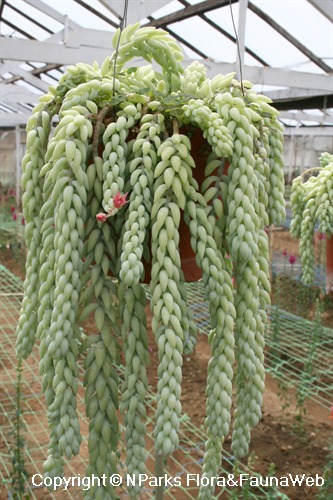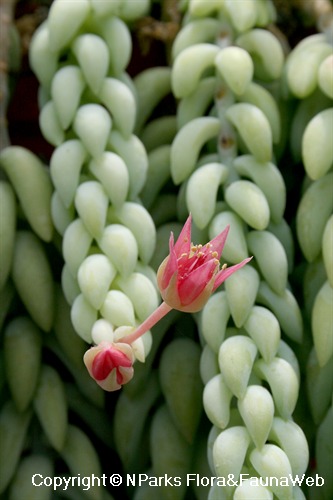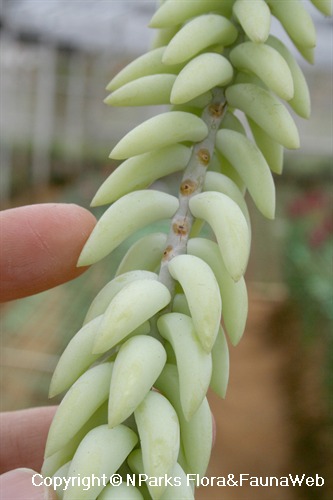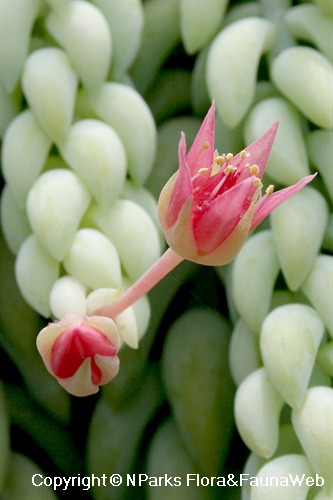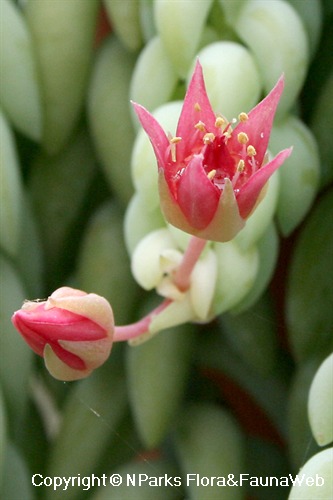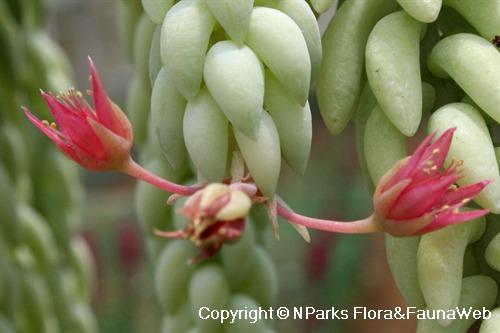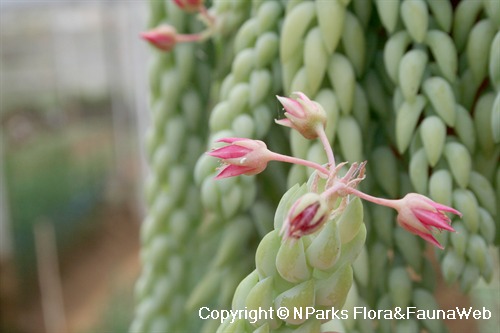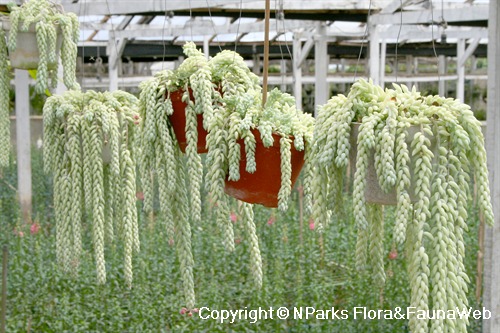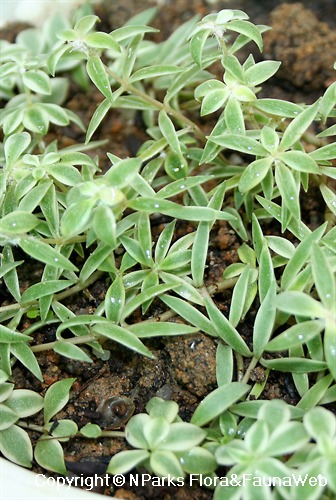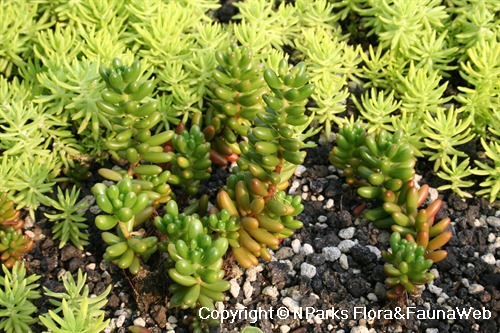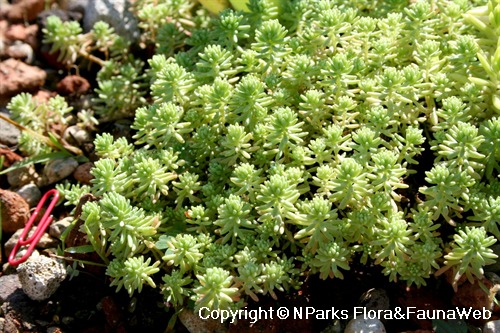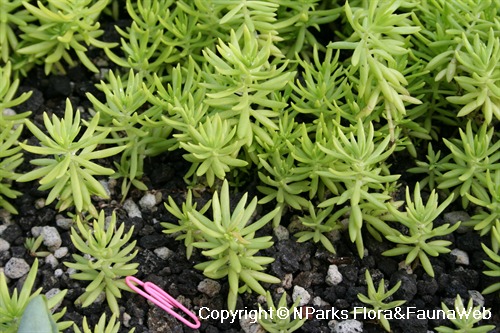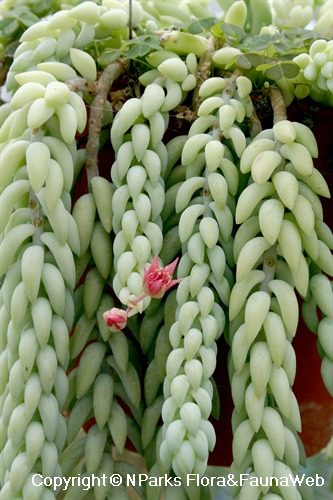
Back
Sedum morganianum E.Walth.
| Family Name: | Crassulaceae |
| Common Name: | Burro's Tail, Donkey's Tail, Cola de Burro, 串珠草 |
Name
Classifications and Characteristics
| Plant Division | Angiosperms (Flowering Seed Plants) (Dicotyledon) |
|---|---|
| Plant Growth Form | Herbaceous Plant |
| Lifespan (in Singapore) | Perennial |
| Mode of Nutrition | Autotrophic |
| Plant Shape | Weeping / Pendulous |
| Maximum Height | 0.3 m to 1.2 m |
| Maximum Plant Spread / Crown Width | 0.4 m |
Biogeography
| Native Distribution | Mexico |
|---|---|
| Preferred Climate Zone | Tropical |
Description and Ethnobotany
| Growth Form | Herbaceous succulent trailing sub-shrub. |
|---|---|
| Foliage | Leaves powdery-green to bluish-green due to whitish bloom, spindle-shaped, recurved with pointed tip, fleshy and turgid, 20mm long by 8mm wide, closely-whorled around stem. |
| Stems | Fleshy, long and pendulous stems can reach up to 1.2m long. |
| Flowers | Small but showy, with pink petals, yellow anthers, fleshy lighter pink sepals and slender pedicels, secrete abundant nectar, borne in few-flowered inflorescences at ends of stems, rarely produced and only in mature specimens with stems of at least 25cm length. |
| Fruit | Not observed before. |
| Similar | Resembles Sedum burrito (Baby Burro's Tail), but latter is of smaller form, with straight leaves that are shorter and blunt-tipped, as well as smaller flowers. |
| Cultivation | In Singapore, this species requires air conditioning to survive. It likes being potbound in well-drained media that is allowed to dry between watering. Avoid shifting plant too much or placing in high-traffic area, as leaves detach easily from stems when disturbed, and when heavy stems cut into edge of container. Wrap container's edge with split water-hose to protect stems from damage. May be affected by mealybugs -- remove by wiping or spraying with diluted water-detergent solution. Easily propagated by leaf cuttings, or stem cuttings -- remove leaves from base and allow cut end to dry for 1-2 days before inserting into moist sand or cactus soil mix. Plantlets emerge in a few days. |
| Etymology | Genus epithet 'Sedum' derived from Latin word for 'sit', an allusion to how some species of this genus attach themselves to rocks and walls. Species epithet 'morganianum' named by American botanist Eric Walther (1892-1959) in honour of Californian plant hobbyist and expert grower Dr Meredith Morgan, who in 1938 was the first person to get the plant to bloom outside of Mexico. The flowers enabled Walther to identify and describe the species, 3 years after he discovered cultivated specimens growing in tin cans hung from walls in a Mexican nursery. Species is a frequent escapee, hence actual habitat is unknown but thought to be in southern Mexico. |
Landscaping Features
| Desirable Plant Features | Ornamental Foliage, Ornamental Flowers |
|---|---|
| Landscape Uses | Suitable for Hanging Baskets, Interiorscape/ Indoor Plant, Vertical Greenery / Green Wall, Focal Plant, Container Planting |
| Thematic Landscaping | Silver Garden, Rockery / Desert Garden |
Fauna, Pollination and Dispersal
| Pollination Method(s) | Biotic (Fauna) (Associated with: Unknown, but flowers secrete lots of nectar.) |
|---|
Plant Care and Propagation
| Light Preference | Semi-Shade |
|---|---|
| Water Preference | Little Water |
| Plant Growth Rate | Moderate |
| Rootzone Tolerance | Drought Tolerant, Well-Drained Soils, Poor Infertile Soils |
| Planting Remarks | In Singapore, this species requires air conditioning to survive. |
| Maintenance Requirements | Moderate |
| Potential Problems | Leaves drop off easily from stems, when disturbed. |
| Diseases | May be affected by mealy bug. |
| Pest(s) | Associated with, Sucking Insects |
| Propagation Method | Stem Cutting, Leaf Cutting |
| Propagule Establishment Remarks | Stem Cuttings: Remove leaves from base, allow cut end to callous over 1-2 days, before rooting cutting in dsmp porous media. Leaf Cuttings: Place detached leaves on media, and allow to root. Plantlets emerge in a few days. |
Foliar
| Foliage Retention | Evergreen |
|---|---|
| Mature Foliage Colour(s) | Green, Silver / Grey |
| Mature Foliage Texture(s) | Smooth, Thick |
| Foliar Type | Simple / Unifoliate |
| Foliar Arrangement Along Stem | Whorled |
| Foliar Shape(s) | Non-Palm Foliage (Oblong) |
| Foliar Margin | Entire |
| Foliar Apex - Tip | Acute |
| Typical Foliar Area | Notophyll ( 20.25cm2 - 45 cm2 ) |
Non - Foliar and Storage
| Stem Type & Modification | Herbaceous |
|---|---|
| Root Type | Underground (Fibrous Root) |
| Specialised Storage Organ(s) | Aboveground |
Floral (Angiosperm)
| Flower & Plant Sexuality | Bisexual Flowers |
| Flower Colour(s) | Purple |
|---|---|
| Flower Symmetry | Radial |
| Flowering Period | Rarely |
| Flowering Habit | Polycarpic |
Image Repository
Others
| Master ID | 29135 |
|---|---|
| Species ID | 3444 |
| Flora Disclaimer | The information in this website has been compiled from reliable sources, such as reference works on medicinal plants. It is not a substitute for medical advice or treatment and NParks does not purport to provide any medical advice. Readers should always consult his/her physician before using or consuming a plant for medicinal purposes. |

